Editor:
Brandon Sweet
University Communications
bulletin@uwaterloo.ca
Thrive Month starts today
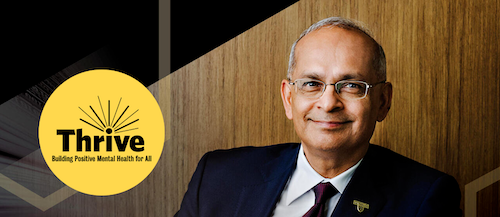
Thrive Month has begun. Hear from President Vivek Goel as he kicks off the month with a video message.
Join us for a series of events focused on building a culture of wellbeing and normalizing mental health struggles for Waterloo students and employees (faculty, staff, CUPE).
Thrive at events such as:
- PART: Let’s Talk about Mental Health at the Intersections - October 21
- United Way Cooking Show - October 28
- Mindful Morsels - November 1 and 8
- Managing your time and energy (for staff and faculty) - November 5
- COVID-19: Self-care strategies (for staff and faculty) - November 9
- Student Mental Health Research Conference - November 10
This past year, you have worked exceptionally hard to manage your work, personal, and family life. It is normal to feel overwhelmed, stressed, anxious, and experience difficulties. Please know that you are not alone. When you are faced with these challenges, we encourage you to reach out to your colleagues, supervisors, and friends. Students can make an appointment with Counselling Services at 519-888-4567 ext.32655, or call Empower Me for 24/7 care at 1-833-628-5589. Staff and faculty can contact Occupational Health at 519-888-4567, ext. 40551 or 40538 and use the Employee & Family Assistance Program.
Through Thrive, we encourage everyone to share responsibility for promoting mental wellbeing on campus and have open conversations about mental health challenges. Let’s Thrive together.
A brief history of Black experience at Waterloo, 1960s -1990s
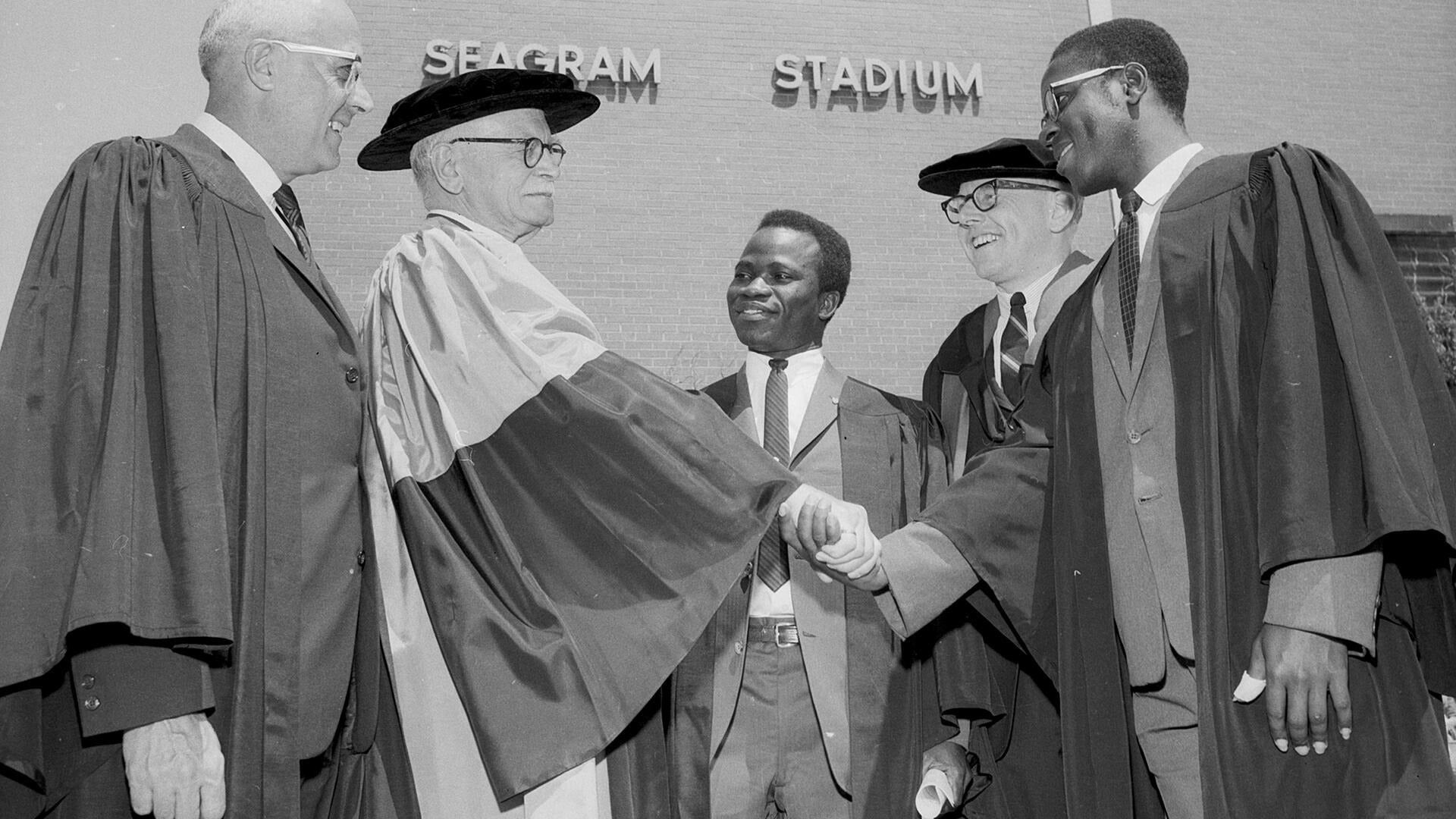
Left to right: Douglas V. Gonder, honorary doctor of laws, Gen. A.G.L. McNaughton, honorary doctor of engineering, Oluremi Balogur, graduating engineer, Dean Douglas Wright, and Chukuma Nwachuko, graduating engineer outside Seagram Stadium during Convocation.
By Jonathan Zi En Chan. This is an excerpt of an article originally published on Waterloo News.
Early this year in a conversation about marking Black History Month at University of Waterloo, History professor Christopher Taylor raised the question about Black history at the University. “I know work has been done on Waterloo region’s Black history,” Taylor said, “but what about specifically at the University? Who was the first Black prof? Who were the first students? What are the achievements by Black folks on campus? What about protest and resistance?”
The conversation also prompted Taylor to stress that any month is the right month to learn from and reflect on Black history. “I'm a firm believer that Blackness doesn't end on February 28/29, and these stories should be year-round.”
Taylor has just been appointed Associate Vice President, Equity, Diversity, Inclusion and Anti-Racism for the University, and is a founding member of Waterloo’s Black Faculty Collective. Within the Department of History, he works with research assistant Jonathan Zi En Chan.
Knowing that researching and documenting Black history at Waterloo could be a big project and should not be rushed, Taylor asked Chan to begin the work. Their intention was to research the presence of Black students, faculty and courses at Waterloo, and disseminate the findings, once ready, in The Sankofa Journal of Interdisciplinary Studies, a new open-source journal founded by Taylor. In the meantime — because any time is the right time to talk about Black history —they are sharing highlights from the research to date.
Chan, who is a PhD candidate in History, found that Black students and several notable Black faculty members were at the University of Waterloo since the early 1960s. “The campus was often filled with the students’ vibrant activity and advocacy,” he says, “while the faculty members pioneered the first courses on African and Black studies.” At that time, he adds, most Black students came to the university as international students from African countries.
Black student experiences
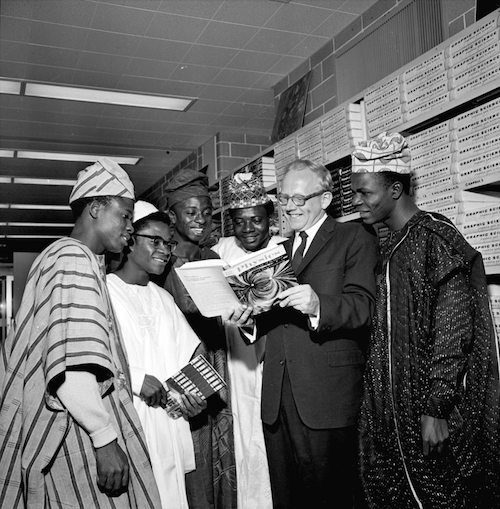
Dean of Engineering Douglas Wright with international students from Nigeria in 1962.
In 1961, the university participated in the Kennedy Airlift, a movement started two years prior by a Kenyan named Tom Mboya to support Kenyan students’ post-secondary education in Canada and the United States.
Waterloo welcomed five students from Nigeria, all of whom won a scholarship from the African Student Foundation, which organized the Airlift initiative in Canada. The campus student newspaper (then called The Coryphaeus) chronicled Black student activities and experiences on campus, including their hopes, dreams, and fears for their futures and home countries as they treaded down the path of decolonization.
However, by the late ‘60s, the University had difficulty accommodating accepted Black and other international students as Canadian public opinion shifted. International students were viewed not as people who could benefit from Canadian education, but as parasites who took up valuable enrollment quotas from their children. This problem was intensified with the Sir George Williams affair in 1969 at present-day Concordia University — when students occupied a computer lab protesting racist marking. The incident was widely attributed by media to slack immigration laws, and Caribbean students in particular were demonized as troublemakers.
In 1970, Waterloo’s Chevron student newspaper ran an editorial calling on the University to “Canadianize” and protect itself from foreign influences. One of the paper’s recommendations to the government was to “review its policy on foreign graduate students … whether the cost of their education is to be regarded as international aid … and they should be required, upon graduation, to return to their country of origin…”.
Despite periods of antagonism from certain segments of the campus, Black student associations strived to create lively and vibrant space for their members. In addition to creating a place of belonging for their members, the African Student Association (ASA) and the Caribbean Student Association (CSA — now the Association of Caribbean Students) often jointly hosted symposiums that invited scholars and government officials from the African Continent and Caribbean to give talks on decolonization, which also engaged the wider student body. This intercultural engagement may have encouraged many Waterloo students to join humanitarian exchange trips to the African Continent hosted by various organizations, such as Crossroads and CUSO. Both Black student associations often advocated for the concerns of the Black student body. In 1975, for instance, a Chevron editorial by ASA president Oye Ibidapo Obe spoke up against foreign students being considered tourists rather than being issued student visas.
Black faculty experience
Some of the earliest hires of Black professors at the University of Waterloo in the 1960s had lasting impacts on the community and the world. The first Black professor at Waterloo was Dr. Locksley Edmondson, an assistant professor in Political Science. He taught from 1963 to 1967 before taking a leave of absence to teach in Makerere University in Uganda. Edmondson returned to North America in the early 1970s and eventually took up a position at Cornell University where he became the director of African Studies.
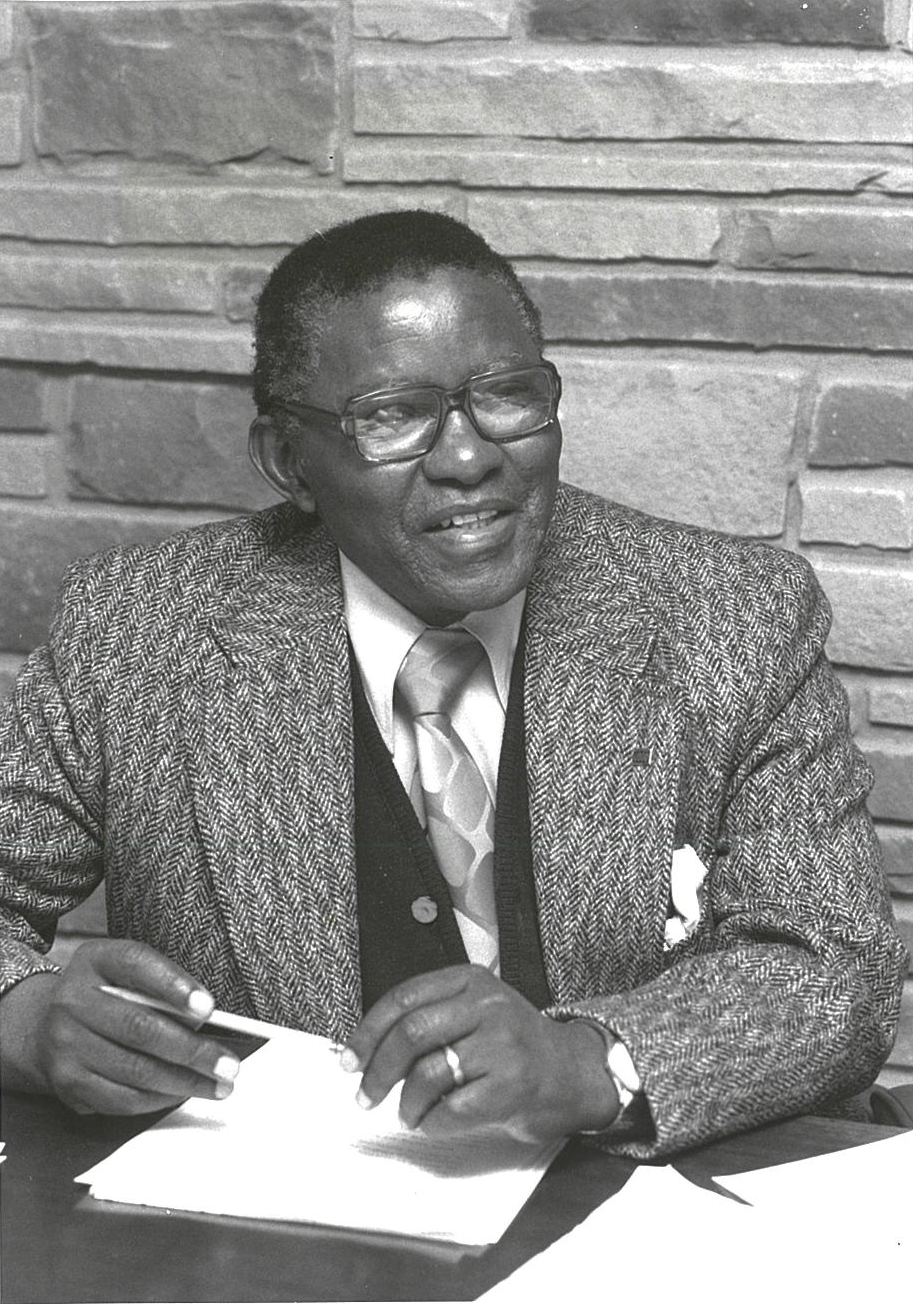
Dr. Donald M’Timkulu, was hired in the late 1960s as a professor of Sociology at Renison College. He was a popular teacher best known for his courses on Race and Culture In the Third World. M’Timkulu also established the beginning of the Applied Social Science program that eventually became Renison’s School of Social Work. In addition to teaching, M’Timkulu was the director of the Mindolo Ecumenical Centre, an active participant at the University of Waterloo’s CUSO committee, and part of many African Studies societies.
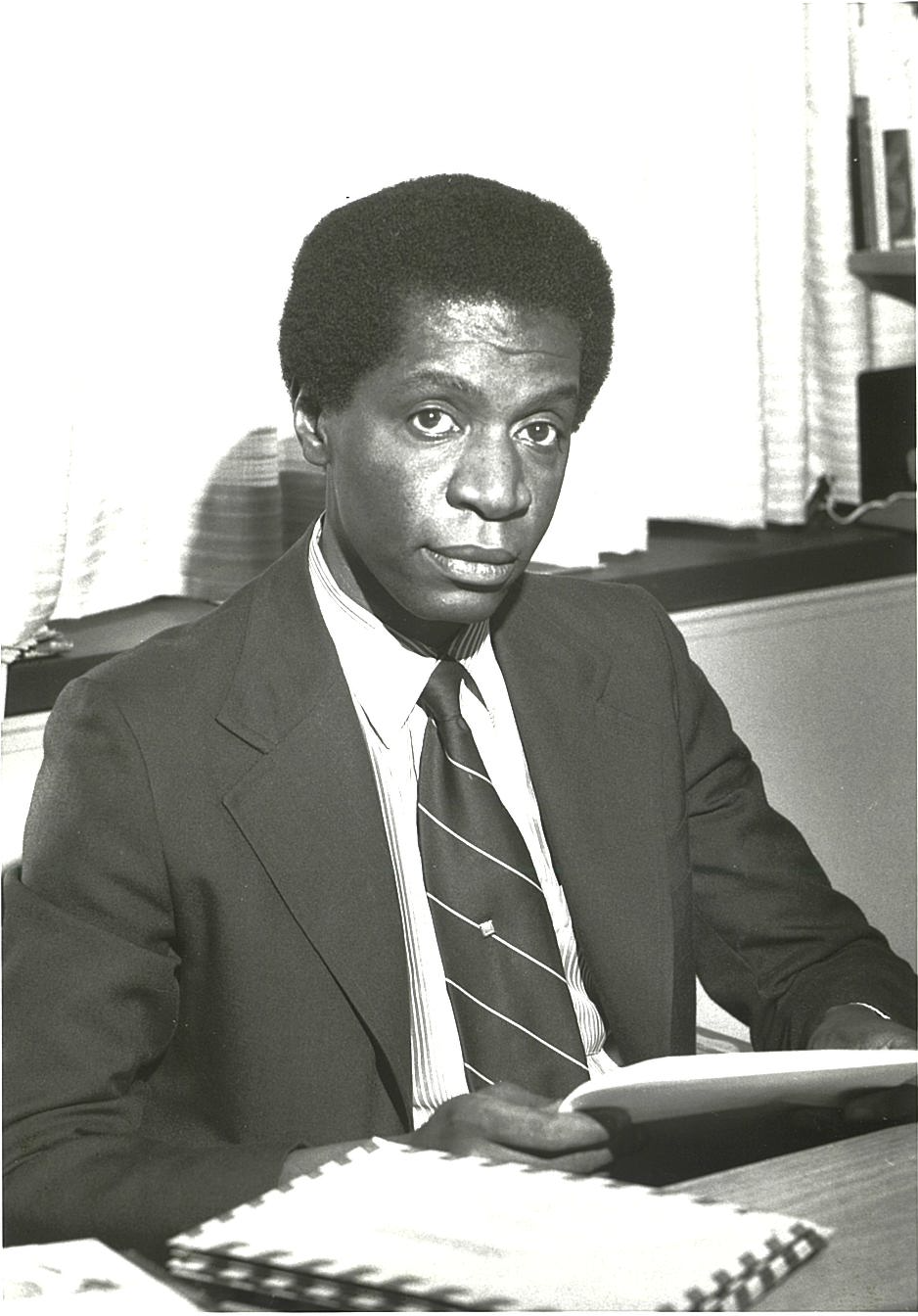
Dr. Karl Bennett, born in Jamaica, was an Economics professor until 2002, and was department chair from 1981 to 1987. Bennett served on multiple committees throughout his tenure at Waterloo, such as the Government of Canada Treasure Board in 1971 and 1982, Ontario Premier’s Council on Economic Renewal in 1991 to 1995, and UN Caribbean Regional Integration Advisory Team in 1975. To this day, Bennett remains an active member in the Caribbean Canadian Association of Waterloo Region which grants scholarships to promising students of Caribbean heritage. Dr. Bennett serves as an adjudicator of the scholarship committee.
Read the rest of the article on Waterloo News.
United Way presents Yoga: Wellness Through Gentle Movement, Breath and Gratitude
A message from the United Way Campaign.
Feeling worn out physically and mentally? Need a moment to unplug and unwind?
Join us on October 19 from 10:30 a.m. to 11:30 a.m. for guided light yoga, mindful meditation, breathing techniques and gratitude, taught by Sandra Gibson from Campus Wellness. This event is brought to you by Keeping Well at Work, and in collaboration with our United Way campaign.
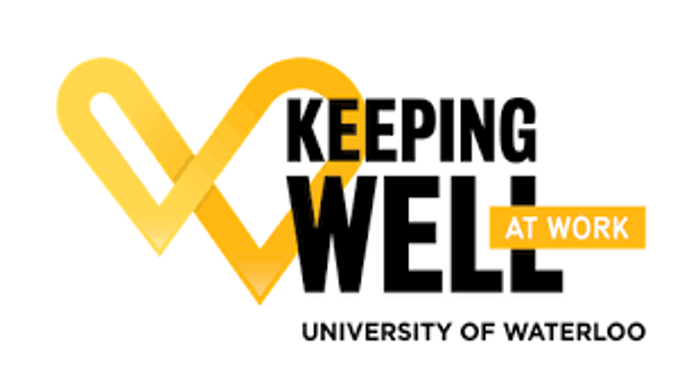
This event was inspired by one of United Way WRC's focus areas, mental health. Visit their webpage to learn more about how mental health impacts our community, as well as the agencies they fund that address it: https://www.uwaywrc.ca/what-we-do/focus-areas/mental-health/
Register with Keeping Well at Work on the portal to attend. All attendees get entered into a draw to win one of three prizes generously donated by Midtown Yoga Kitchener Waterloo.
- Yoga mat (valued at $49.99+hst)
- Free 30-day trial (valued at $59+hst)
- $25 gift card to use at the studio (expires December 31st, 2021)
No equipment or mat is necessary to participate, although we encourage you to have a pen and paper handy, as well as wear comfortable clothing.
Event admission is complimentary, but we encourage you to make a donation to the UW United Way Campaign through e-Pledge as you participate in any of our core events this year.
Check out our silent auction as well, with items created and prepared by each of the Faculty Deans. All proceeds will go toward our United Way Campaign. View all the items and get ready to place your bids when the auction goes live on October 25.
Your Daily Inspiration, Senate meets today, and other notes
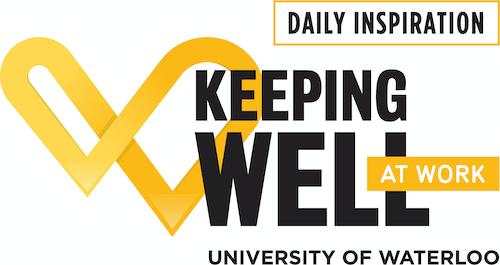
Today's Daily Inspiration
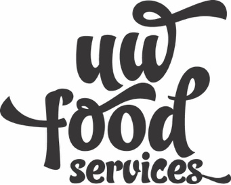
Healthy recipes can be simple
Focus on foods you enjoy and balance. Try some of these 5-ingredient breakfast, lunch and dinner recipes from our friends at Food Services.
The University's Senate meets today at 3:30 p.m. on MS Teams. Among the agenda items:
- A motion to approve a degree description change from the Diploma in Sexuality, Marriage, and the Family to the Diploma in Sexuality, Marriage, and Family Studies, effective September 2022;
- A motion to approve the inactivation of the Diploma in Education Program for Photonics Professionals;
- A motion to approve a central statement regarding the undergraduate communication requirement, effective September 2022;
- A motion to approve the lists of candidates for degrees, diplomas and certificates as recommended by the Faculty councils and the associate vice-president, graduate studies and postdoctoral affairs for the upcoming Convocation ceremonies;
- A motion to approve a number of committee appointments;
- A motion to approve updates to the regular full-time graduate students definition regarding the number of hours a student can be employed by the University, effective September 2021;
- A motion to approve the 2022-2023 academic calendar dates and calendar guidelines for establishing academic dates;
- A motion to approve the proposed new Canadian Politics and Public Policy Minor in the Faculty of Arts, effective September 2022;
- A motion to approve changes to the human rights minor in the Faculty of Arts and St. Paul's University College, effective September 2022;
- A motion to approve an earlier effective date of 1 September 2021 for the optometry advance standing program;
- A motion to approve the inactivation of following academic plans, effective 1 September 2022:
- Public Policy and Administration Minor
- Canadian Politics Specialization
- Global Governance Specialization
- Politics and Business Specialization; and
- A motion to approve revisions to the transfer student regulations in the Faculty of Science, effective September 2022.
Professor Suzanne Kearns will give a presentation on the newly-launched Waterloo Institute for Sustainable Aeronautics.
This is a reminder that UW Fitness (part of CCCARE – Centre for Community, Clinical and Applied Research Excellence) will once again offer livestream exercise classes to UWaterloo staff and faculty this fall. Registration is now open for the six-week sessions that start November 1.
Link of the day
When and Where to get support
Students can visit the Student Success Office online for supports including academic development, international student resources, leadership development, exchange and study abroad, and opportunities to get involved.
Instructors looking for targeted support for developing online components for blended learning courses, transitioning remote to fully online courses, revising current online courses, and more please visit Agile Development | Centre for Extended Learning | University of Waterloo (uwaterloo.ca).
Instructors can visit the Keep Learning website to get support on adapting their teaching and learning plans for an online environment.
Course templates are available within your course in LEARN to help you build and edit your content and assignment pages quickly.
The following workshops, webinars, and events are offered by the KL team (CTE, CEL, ITMS, LIB):
- Independent Remote Course Design Essentials, self-directed, continuous self-enrollment course in LEARN.
- Independent Blended Course Design (iBlend), self-directed, ongoing
- Copyright Overview for Waterloo Instructors and Staff - self-directed, continuous self-enrollment course in LEARN.
-
Thirty Minute Thursdays– PebblePad – Offered: October 21, October 28, November 11, November 18, November 25, 12:00 noon to 12: 30 p.m.
-
PebblePad Users Group (CTE7526) - October 20, 1:00 p.m.
-
Online Instructional Skills Workshop (ISW) (CTE8601), begins on October 22, 8:00 a.m.
-
Getting Ready to Facilitate Online Courses: TA Training, beginning November 1.
Employees can access resources to help them work remotely, including managing University records and privacy of personal information. Here are some tips for staying healthy while working from home.
Stay informed about COVID cases on campus by consulting the COVID case tracker.
The Writing and Communication Centre has virtual services and programs to help undergrads, grad students, postdocs and faculty members with academic writing.
- Meet with writing advisors in one-to-one appointments to brainstorm, draft, revise, and polish. No time for an appointment? Try email tutoring for undergrads.
- Beat isolation and make writing progress at weekly Virtual Writing Cafés for grad students and faculty or PJ-Friendly Writing Groups for Undergrads.
- Take an online workshop or apply to our popular Dissertation Boot Camp program.
- Faculty can request custom in-class workshops for their courses, or the WCC can facilitate any existing workshops for student groups.
Co-op students can get help finding a job and find supports to successfully work remotely, develop new skills, access wellness and career information, and contact a co-op or career advisor.
The Centre for Career Action (CCA) is offering some in-person services for fall 2021. The Tatham Centre is open with front-desk support, limited in-person appointments and co-op consults. Services are also available virtually. Book an appointment online or Live Chat with our Client Support Team. The CCA is here to help.
If you feel overwhelmed or anxious and need to talk to somebody, please contact the University’s Campus Wellness services, either Health Services or Counselling Services. You can also contact the University's Centre for Mental Health Research and Treatment. Good2Talk is a post-secondary student helpline available to all students.
While the Library continues to focus on digital resources and consultations, our spaces are open for the fall term. Dana Porter Library is open Monday to Friday, 9 a.m. to 5 p.m., and Davis Centre Library is open Monday to Friday, 9 a.m. to 11 p.m., and Saturday and Sunday, 11 a.m. to 5 p.m. for drop-in individual study space, bookable individual study rooms, drop-in access to computers and printers, book pick-up services and IST Help Desk support. Special Collections & Archives and the Geospatial Centre will be accessible by appointment. Library staff are available for questions via Ask us. Full details on current services and hours are available on the Library’s COVID-19 Update webpage.
The Faculty Association of the University of Waterloo (FAUW) continues to advocate for its members. Check out the FAUW blog for more information.
The University of Waterloo Staff Association (UWSA) continues to advocate for its members. Check out the UWSA blog for more information.
The Sexual Violence Prevention and Response Office (SVPRO) supports all members of the University of Waterloo campus community who have experienced, or been impacted, by sexual violence. This includes all students, staff, faculty and visitors on the main campus, the satellite campuses, and at the affiliated and federated Waterloo Institutes and Colleges. For support, email: svpro@uwaterloo.ca or visit the SVPRO website.
The Indigenous Initiatives Office is a central hub that provides guidance, support, and resources to all Indigenous and non-Indigenous campus community members and oversees the university Indigenization strategy.
The Waterloo Indigenous Student Centre, based at St. Paul’s University College, provides support and resources for Indigenous students, and educational outreach programs for the broader community, including lectures, and events.
WUSA supports for students:
Peer support - MATES, Glow Centre, RAISE, Women’s Centre - Visit https://wusa.ca/peersupport to book an appointment either in person or online for the Fall term!
Food Support Service food hampers are currently available from the Turnkey Desk 24/7 in the Student Life Centre. Drop off locations are also open again in SLC, DC, DP, SCH and all residences.
Co-op Connection all available online. Check https://wusa.ca for more details.
Centre for Academic Policy Support - CAPS is here to assist Waterloo undergraduates throughout their experience in navigating academic policy in the instances of filing petitions, grievances and appeals. Please contact them at caps@wusa.ca. More information is available.
WUSA Student Legal Protection Program- Seeking legal counsel can be intimidating, especially if it’s your first time facing a legal issue. The legal assistance helpline provides quick access to legal advice in any area of law, including criminal. Just call 1-833-202-4571.
Empower Me is a confidential mental health and wellness service that connects students with qualified counsellors 24/7. They can be reached at 1-833-628-5589.
When and Where (but mostly when)
Healthy Warriors at Home (Online Fitness)
Warriors vs. Laurier Blood Donation Battle. Join your fellow Warriors, donate blood and help us win the Blood Battle against Laurier for a second year in a row. Set up a profile or add the PFL code: UNIV960995 to your account if you have a blood.ca account already. Questions? Contact WarriorsInfo@uwaterloo.ca.
Drop-in to Warrior Virtual Study Halls on Wednesdays from 5:30 p.m. to 7:00 p.m. Come together in this virtual space to set goals and work independently or in groups each week.
Renison English Language Institute continues to offer virtual events and workshops to help students practice their English language skills.
Women's Entrepreneurship Week 2021, Monday, October 18 to Friday, October 22, Virtual Speaker Series, details and a link to the virtual talk will be sent to those who register through Zoom.
Move to Thrive: Thrive Walk, Monday, October 18, 12:15 p.m. to 12:45 p.m.
University Senate meeting, Monday, October 18, 3:30 p.m.
Keeping Well at Work conference, Tuesday, October 19.
Spanish and Latin American Studies presents Dr. Dolores Figueroa Romero, “Binational Dialogues on the Challenges to Document Violence Against Indigenous Women in Mexico and Canada,” Tuesday, October 19, 11:00 a.m. RSVP to Jorge Castaneda Ochoa, j3castanedaochoa@uwaterloo.ca.
GEDI Exchange Webinar - A 30 Minute Exchange with Metagenom Bio and Ceragen, Tuesday, October 19, 1:00 p.m. Join this discussion with Metagenom Bio and Ceragen as they discuss Microbiomes: Building a business and feeding the world. Register online.
Portfolio & Project Management Community of Practice (PPM CoP) session, "Expect the best, plan for the worst and prepare to be surprised" Wednesday, October 20, 9:00 a.m. to 10:00 a.m. Register for this event.
Noon Hour Concert: Music of South India, Wednesday, October 20 at 12:30 p.m., online.
WaterTalk: Water Resources and Food Supply Chains, Presented by Megan Konar, Thursday, October 21, 10:00 a.m.
NEW - THRIVE: Shadowboxing, Thursday, October 21, 12:00 noon (Warrior Field). Free for students, staff and faculty. Register now.
NEW - Problem Lab and Faculty of Environment event, “Finding Your Triple Bottom Line,” Thursday, October 21, 5:30 p.m., Zoom.
Fall Convocation PhD reception, Thursday, October 21, 7:00 p.m.
2021 Benjamin Eby Lecture, “Composing Louis Riel's Dream: Exploring the history of the Red River Settlement through family stories and music”, Thursday, October 21, 7:30 p.m., Conrad Grebel University College. Virtual event.
Fall Convocation ceremonies, Friday, October 22 and Saturday, October 23.
NEW - 2021 Gairdner Lecture,Acting Early: From Developmental Science to Scalable Prevention, Friday, October 22, 2:30 p.m. to 3:15 p.m. Please register in advance.
Lectures in Catholic Experience, "Religion and Vaccine Hesitancy in the Age of Anxiety," Friday, October 22, 7:30 p.m.
Warriors Football vs. Western, Saturday October 23, 1:00 p.m. Think Pink in support of the Breast Cancer Cause at the Canadian Cancer Society, Donor Appreciation Day. Purchase tickets.
WaterLeadership training seminar: Create engaging virtual presentations, Presented by Elise Vist, Tuesday, October 26, 1:00 p.m.
Board of Governors Meeting, Tuesday, October 26, 1:30 p.m.
Pivot-RP Training Session for Waterloo faculty and staff who support research proposal development. Tuesday, October 26, 2:00 p.m. to 3:00 p.m. Please register to receive a link to this session on Teams.
Emergency: The Citizen’s Guide to Climate Success – The 2021 Hagey Lecture, Wednesday, October 27, 8:00 p.m. Register to watch the livestream.